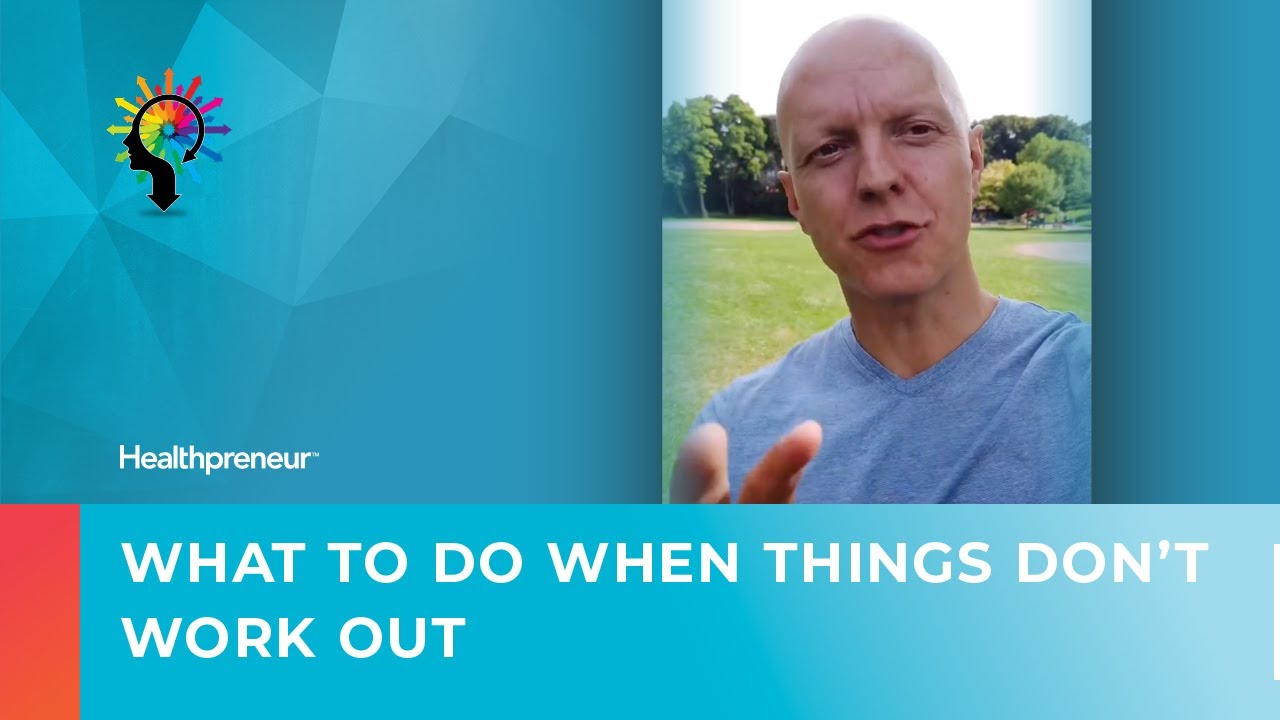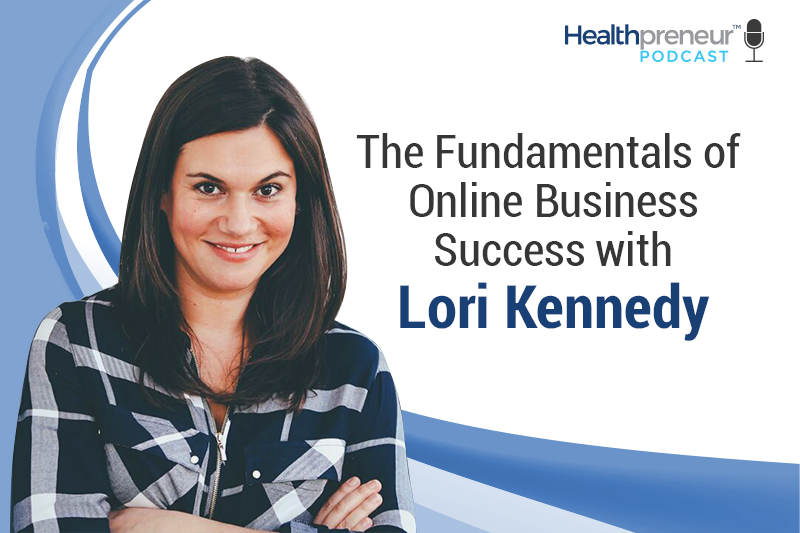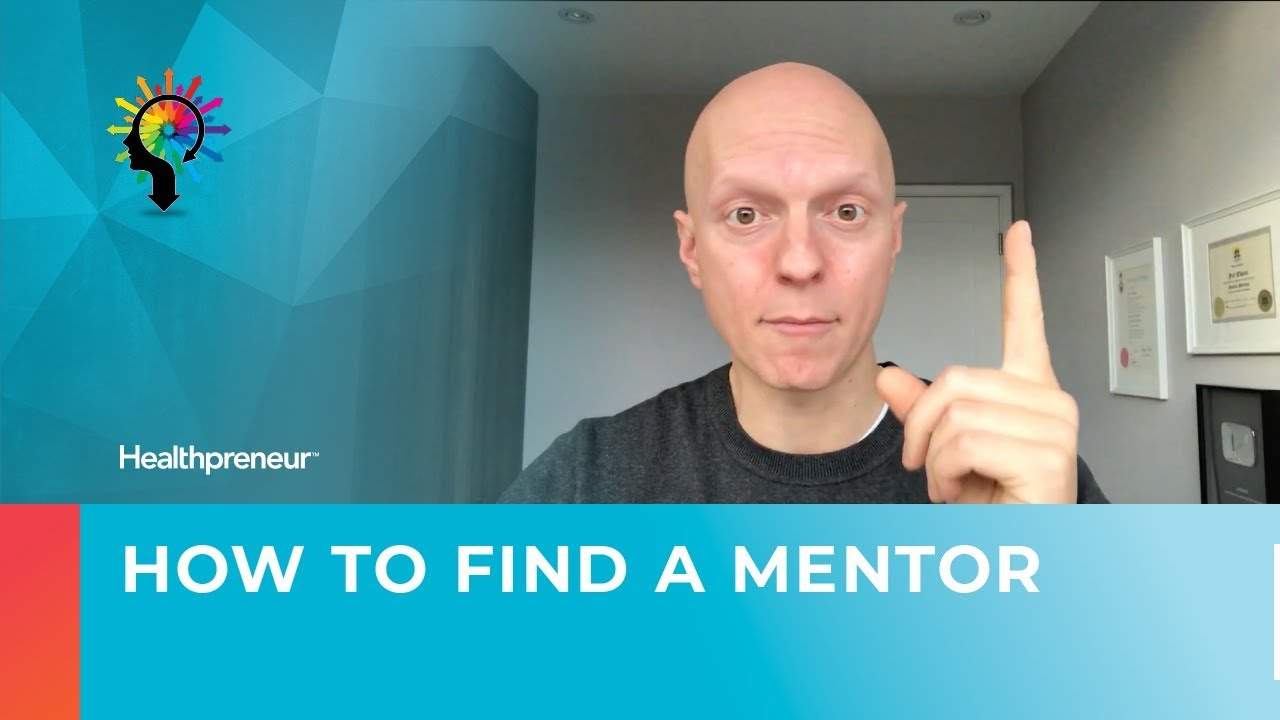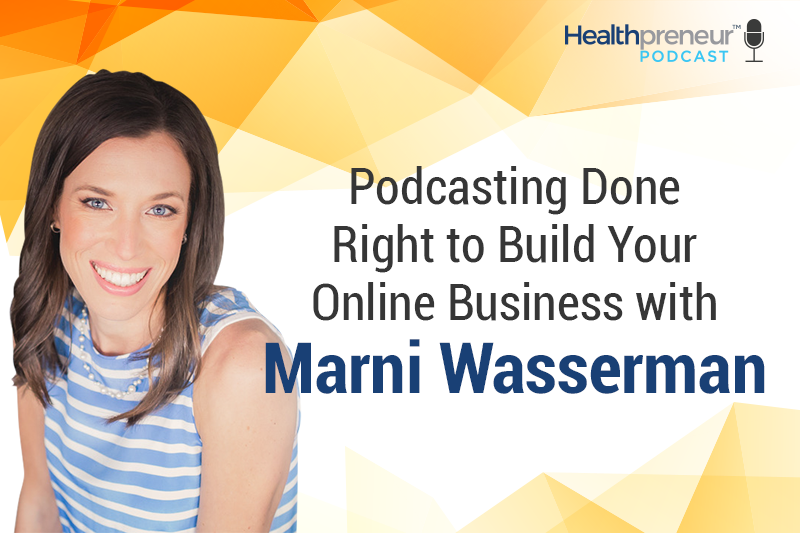5 Ways to Be a More Productive Entrepreneur
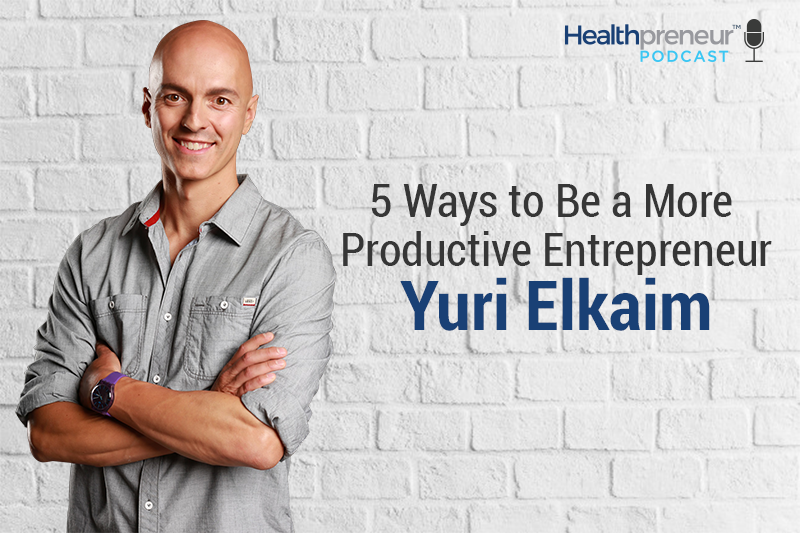
For today’s solo round on the Healthprenuer Podcast I’m gonna be talking to you about five ways to be more productive as an entrepreneur. Being an entrepreneur is all about being efficient and effective. I am a huge believer in working smarter not harder, and what I’m going to share will help you do that.
The tricky thing about being an entrepreneur, as opposed to being a nine-to-fiver, is that you don’t have a set schedule unless you make one. You don’t have a boss yelling at you if you come into work late or miss your deadline. So you need to be as productive, efficient, and effective as possible.
I’m also going to touch on procrastination, which can be another fatal trap for entrepreneurs. So whether you’re just starting out or you’ve been running your own business for years, I guarantee you will get something out of these five tips.
In this episode I discuss:
2:00 – 4:00 – Long-term focus.
4:00 – 9:00 – Controllable vs. uncontrollable
9:00 – 11:30 – Tangible sprints
11:30 – 14:00 – The night before
14:00 – 17:00 – Self control
17:00 – 20:00 – Recap and conclusion
Transcription
Hey guys, what’s up? Yuri here, welcome back to the Healthpreneur podcast.
In this episode I’m going to walk you through five ways to be a more productive entrepreneur, because it’s all about being effective and efficient—otherwise you’re just wasting your time. I’m a huge believer in working smarter not harder and if you’re the same, what I’m about to share with you is going to be extremely valuable.
So without any further ado, let’s jump into these five tips.
Now there’s other ways to be more productive but what I like about these is that they all flow together. If you want to take down some notes, you can do that.
1) Long-term focus
Tip number one is to focus on one major project at a time. When I say at a time I’m essentially saying … When you look at scheduling your year—and I’m going to challenge you here—really figure out what the handful of big outcomes you want to achieve in the year are. I’m talking about a maximum of five here. These would be related to a project.
Let’s say for instance, that you had a product that you wanted to launch to market and achieve a certain number of sales. That would be one project.
Now what I’m going to say to you is that if that’s your focus, make that the only thing you work on for at least the next 90 days. And this is tough because there are other things you have take care of in your business.
But the whole idea is that you want to set things up so that 80% of your time is spent on the most important project. 20% of your time is spent on the little things that have to get tidied up and the little errands—the stuff that doesn’t really move the needle forward but just has to get done.
The key is to identify one major project at a time and do your very best to stick to it.
Now, if you have a team of people, it might be a little bit different. But what I can say from experience is that even when running a team of about 14 people, we had a very tough time focusing and effectively executing more than two or three projects at a time.
And even though we had smaller silos working on individual projects, when the team is split, when the company in terms of its focus is split, you’re not going to get the same results.
Whereas if you said, “Okay everyone. The only thing we’re going to do for the next three months is this one thing. Here’s what you’re going to do, here’s what you’re going to do, here’s what I’m going to do, we’re all going to work together to make this happen.” When you can focus—that’s the power.

It’s very much like getting a magnifying glass when you were a kid and roasting those ants under the beam of sunlight. And I know you probably did that—if you were like I was. Maybe you weren’t, maybe you just burned some grass and you were nice to the ants.
The power of focus is extremely, extremely important. There’s a great book if you want to go deeper on this, it’s called, The One Thing and it is about finding that one thing to focus on. So that’s the first way to be more productive.
2) Controllable vs. uncontrollable
The second thing is that once you’ve identified that one big thing … How do we tackle that? How do you eat an elephant? As the saying goes.
Well you take one bite at a time.
What we’re going to do next is we’re going to identify from that big project—what are the controllable actions that we can start taking to move us closer to the outcome?
A lot of times businesses and entrepreneurs deal with anxiety, and this anxiety generally comes from focusing on things we can’t control. You’re saying you want to make a million dollars. Great—if you’re only focused on the outcome, that’s the outcome.
You can’t control how much money you make. You can indirectly, by focusing on saying “Okay, I’ve got to make this many sales, this much money, that is an indirectly uncontrollable type of outcome.
But when we focus on that, we tend to feel more anxious and the reason for that is because we don’t have a bridge from what we’re saying we want, to what we can do in the present day to move us closer to that.
What we want to do is break down that outcome goal, that thing that is slightly out of our control. Again, let’s just say making a million dollars. Now, we want to break down what all of the things are that we can control to help us move closer to that. This is essentially going to be a brain dump.
You’re going to write down all the different ideas to move this project forward. So again, you want to make a million dollars? Well how are you going to do that? There’s a lot of different ways you can do that.
But let’s just say you have a product that you’re going to go to market with and you know that if you can get the right people involved and have a good Facebook ad funnel, you can crack that code, you can acquire customers at a profit, you can crack a million dollars. Let’s just say that’s the example.
So, you have to identify—what are things we’re going to do to get us there? You want to write down all of the different ideas, the things that you can control. That might mean reaching out to potential partners, continuing to grow your podcast, pumping out three to five videos on YouTube per week, emailing your list on a daily basis.
You want to really think about this. And this I why I continue to say, it’s important to take time away from the business to do the thinking, to do the big strategic thinking. Because when you can really lay out everything that might be involved in a bigger project, it gives you clarity. Now you’ve got all the ideas down on paper, you’ve got everything out of your head and you can start to look at—okay, what makes sense out of all this stuff?
The second thing we’re doing here is we’re breaking down that one big project into controllable actions. And we want to write down as much as we can really think about because a lot of times procrastination can be a problem. And that is something we all deal with.
To be very honest with you, I’m really one of the most sought after experts on procrastination, if you will. And the reason for that is because I wrote the book on it, literally. And that’s because when I was just about to graduate from university, I was studying kinesiology and I decided not to attend any of my swim classes in the morning. We had a swim component to our activity classes. I thought, “Surely the school’s not going to recognize that I didn’t show up to any swimming classes…” And they did.

So I had to make up 20 hours of swimming in the last week before I graduated plus I had to write a 20 page paper on procrastination. So I can literally say that I’ve written the book on procrastination.
The reason we procrastinate is because we’re either delaying something, some kind of pain that we don’t want to experience—like me in the form of swimming, because I can’t stand swimming. I wish I did, it’s a great sport—but I just don’t like it.
That’s the first thing, but the second thing and the thing that is most applicable to a lot of us is that we’re not explicitly clear on what the next actionable step to take is.
So if you say your project is to launch products. That’s a universe in and of itself. But what is the next actionable step for you to take? It might be sit down for one hour tomorrow between twelve and one and brainstorm launch strategy. So you can see how that’s a lot more tangible.
You can almost visualize that happening in your mind. That’s what we want to do, we want to think about these controllable actions as being the next logical step, the next thing we can possibly do. They’re very visual and they usually start with a verb. Brainstorm, call, email, talk to, write down, create—and that’s all about taking that action. That’s the second step.
3) Tangible sprints
The third way to be more productive is the next step following that. So once we’ve identified these controllable actions, we need to schedule them into tangible sprints. And I typically like to work in 14 day sprints.
So I’ll use the example of launching a product. Out of all the things I’ve listed, of things that we need to do that we can control—what can we do in the next two weeks where we can see a measurable moving of the needle?
One of those legs, in terms of what we can focus on, might be, “Alright, for the next two weeks we are going to do massive outreach to a hundred joint venture partners.” So that’s going to mean, “Within that, what are we going to do?”
So our goal is to contact 100 joint venture partners. We can’t control if they’re going to say yes to our request to promote the product but we can reach out to them, that is controllable.
That might be something you focus on for the next two weeks. Then you look at, “Okay. We contacted a hundred people. Our goal is to have 75 of them say yes, what can we do to make it as compelling as possible for them to say yes to promote this product?”
Well, we have to create a really enticing payment, bonus, commission structure. We want to sit down and really figure that out. That might be step one.
Step two is look at creating pre-launch content that might be suitable to specific audiences that our joint venture partners are in the space of. You’re starting to think about what you can do in the next two weeks that’s tangible and that you can see a direct outcome from. Again, this relates back to that list of controllable actions that you had previously written down.
I like to work in two week sprints because then you can look at the outcome you wanted and ask yourself, “Did we hit it?”
If not, why not? If yes, cool—let’s set the bar a little bit higher for the next one.
Two weeks is a good amount of time to get progress done or to see progress. If you go a little bit longer you start to lose focus or forget almost what you’re working on sometimes.
4) The night before
The fourth way to be a more productive entrepreneur is to write down your day the night before. You have all the things you know you’re supposed to work on to make this project come to life. You know to the detail—call Susan, do this, strategize launch plan, you know exactly what’s supposed to happen.
And now you’re simply going to look at, “Okay, we’ve mapped out what we’re going to work on for the next two weeks, we have our tangible sprint and what we’re simply going to do now, if today is Monday, what do I have to do on Tuesday?”
Because again, we want to break this down to a very, very simple level. “What is the next logical action, the next logical step I need to take to move this forward?”
At the end of your day, let’s say it’s Monday—and this is actually really important—take out a sheet of paper or a notepad. I just use a Post-it note, to be honest. And write down the three most important things you’re going to do tomorrow.
It’s important to really limit how many things you’re working on because if you list out ten, there’s no way that’s going to happen. Let’s be honest. If you’ve got ten things to do, you’re just doing too much.
Write down the three most important things you’re going to do. And even within that, there should be one thing, the big needle mover that you need to get done. That needs to be priority number one and that needs to be at the top of the list. That’s the thing you need to work on the next morning, first thing, before you do anything else.
By writing the stuff down before you go to bed or at the end of your day, what this does is it alleviates stress and anxiety. It tells your brain—“Hey, it’s all good. We have this covered, we’ve already written it down. You can take the night off.” You already know what you’re going to be doing tomorrow.
Some people, for whatever reason, think that you can wake up and plan your day after you wake up. Well it’s too late, you’ve already lost the battle. You have to end your day, literally before you go to bed, knowing exactly what tomorrow is going to entail.
Because your subconscious mind is going to start to figure out how we can do this. Write down at least, the most important thing you’re going to do tomorrow and then those ancillary two or three tasks, smaller projects to also complete only after you finish the first one.
But the key is you gotta write this down the day before.
5) Self control
Finally, the fifth way to become more productive. If you’re using a Mac (I don’t know if they have this on PC) I would strongly recommend downloading an app called SelfControl. It’s free and when you download it, it almost looks like it’s a virus that’s gonna hack your computer because it looks like a skeleton or a poison bottle. But it won’t. Here’s what this thing does.
But basically what this will do is you can tell Self Control which websites you want it block you from during a specific amount of time.
For instance, during your block in the morning where you’re going to do your most important project or work, you would tell Self Control, block access to specific sites—let’s say Facebook, YouTube, Gmail, all the social media sites that are distracting you. And you assign however much time. It might be two hours, you can set it for eight hours, literally as much time as you want and here’s the powerful thing: It’s physically impossible to reset that.
Once you hit the submit button and the countdown timer starts, you can throw your computer out of your, off your roof, it could smash on the ground, you could take it back the Apple Store for them to reboot it, it will still not allow you to access those sites until the timer is up. That is awesome.
The thing is, I recognize that environment is always going to trump willpower. And as dedicated and as disciplined as I try to be, I know that if I have that thought like, “Oh, what is so and so doing on Facebook?”

It’s a drug. And I’m sure you know this too—social media, email, these are all addictive platforms and they’re built like that, so we need to set up our environment to win, which means we have to basically just remove ourselves from that stuff.
It’s the same reason that an alcoholic can’t have alcohol in the house. If you’re addicted to sugar, you can’t have chocolate and pastries lying around. It’s the same thing with this. I’m telling you, if you block off two hours in the morning, use Self Control to shut down those most addictive sites, watch what happens to your productivity.
What I’ve noticed, is that I’ll be working on let’s say, writing something or creating a strategy for something. And all of a sudden after doing it for about half an hour, 40 minutes, I start getting a little bit anxious, like I want a little diversion to just change things up.
So, what I’ll do is I’ll go check Gmail sometimes or I’ll go check Facebook and that’s when things start spiraling out of hand.
The cool thing is with SelfControl, you go to those sites and it says, “Sorry, you can’t access this site.” It’s basically like the internet doesn’t work. You’re forced to go back to work and really focus on that. It’s a really, really good tool to help you stay focused and concentrate on what matters most until you’re done. And when you’re done you can reboot your sites, you can reboot all those different platforms and you’re off to the races.
Recap and conclusion
There we go, those are the five ways to be a more productive entrepreneur. Let me recap those.
1) We focus on one big project at a time and really do our best to only do that one thing. You have to say no to a lot of different opportunities. We talked about this in last week’s solo rant. We talked about the two letter word that will transform your business. If you missed that episode, go back and get it because saying no to almost everything is one of the most important things you can do to move yourself forward without distraction. That’s the first thing.
2) Second is we’re going to break down that project into controllable actions that we have control over. We don’t have control over how much money we make, but we have control over the actions that move us closer to making that money.
3) Number three, we’re going to schedule those actions into 14 day sprints. We’re going to allocate which ones we’re going to work on for the next 14 days, which ones we’re going to work on thereafter and move forward from there.
4) Once we’ve allocated the time in terms of what we’re going to work on over the next 14 days, we’re going to write down the next day’s activities before we go to bed, when we finish the day. We’re going to write down the most important thing and then up to three things to get done during that day.
5) Finally, we’re going to use Self Control which is that app you can download for the Mac which will shut down all those distracting sites.
Those are five really powerful ways to be more productive. Basically, it’s my secret sauce for how I’ve been able to get as much done as I have and I think these will really find you well.
If you enjoyed this episode, head on over to iTunes and subscribe to Healthpreneur™ Podcast if you haven’t done so already.
While you’re there, leave a rating and review. It really helps us out to reach more people because that is what we’re here to do.
What You Missed
In the last episode, I spoke to longtime friend of mine, Brad Pilon. We’re part of the same masterminds, we’ve traveled together with our families, we’ve known each other for years.
Brad is one of the original gangsters in our space. He is the one man who really started the whole topic of intermittent fasting, way back in 2006! He released his book, Eat Stop Eat—which has become the bible of intermittent fasting—and at the time, it truly broke every rule out there with respect to dieting and fitness.
Besides Eat Stop Eat, Brad has also started another company called Venus that became the most successful product on ClickBank for three years. We’re talking absolutely monstrous numbers here, which he will get into in the interview.
If you’re wondering what is possible when building an online business … If you have a product, a book, a course and you’re wondering what can happen in terms of numbers and volume, you have to check out what Brad has to say.
You can check out Brad’s story and his the valuable insights he has to share right here.
Related posts
April 6, 2018
Podcasting Done Right to Build Your Online Business with Marni Wasserman
Today, I am chatting with…


